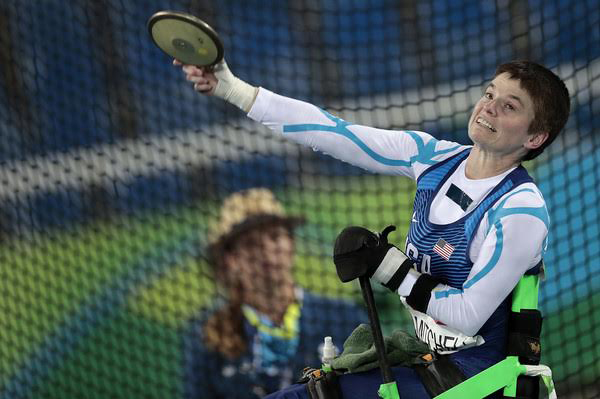This year, several athletes represented Tech and the U.S. in Rio. One of the athletes was Cassie Mitchell, Ph.D., who participated in the 2016 Paralympic Games.
Currently, Mitchell works as a research professor at Tech’s Coulter Department of Biomedical Engineering. She is the principal investigator of the Laboratory for Pathology Dynamics. Mitchell earned her doctorate in biomedical engineering with a concentration in neuroengineering from Tech and Emory University seven years ago.
From a young age, Mitchell was very involved in athletics and international competitions. She grew up on a farm in Oklahoma and trained her horse in Western speed events, winning several world championships by the age of 16. She also was an accomplished gymnast and had aspirations of an Olympic career in gymnastics.
Mitchell then began to focus on track and field and earned a track scholarship as a sprinter. But at her high school graduation, Mitchell had an allergic reaction that caused a neurological condition called Devic’s disease (neuromyelitis optica) to occur. This led to Mitchell being paralyzed from the chest down with impairments to her arms along with permanent double vision.
Despite hesitance from her physician, Mitchell enrolled in Oklahoma State University and earned a Bachelor’s degree in chemical engineering. Mitchell continued to participate in sports in college, such as wheelchair basketball and quad rugby.
After working for ExxonMobil and Syntroleum, Mitchell’s passion for medicine and helping others led her to Atlanta and onto her current career path as a BME research professor.
“Predominantly, my biggest impact for research has been on ALS,” Mitchell said. “It was a disease where I felt like I could make a big difference … because there’s only one treatment that extends life by about a month.
“Because the disease population is smaller, it doesn’t get a lot of attention or funding from pharmaceutical companies and that drove me. … I’m not doing this for financial gain but rather to make an impact in
academic research.”
Mitchell’s love for sports and her competitive spirit pushed her to train for the Paralympics.
“Initially, I thought I would compete in the Olympics in gymnastics, and I would train 20 hours a week at age 6,” Mitchell said. “The Olympic dream has always been on my mind, and after I was paralyzed, once I realized the Paralympics existed, it didn’t take long to get back on that dream.”
In the 2011 World Championships, Mitchell became the first female quadriplegic world champion in paracycling.
Paralympic athletes are classified according to their disability so that athletes with similar impairments compete against each other. Mitchell’s classification is T51, a designation for athletes paralyzed from the chest down. She competed in London 2012 but did not win a medal. Mitchell trained heavily for Rio 2016 despite also having to manage time due to chemotherapy treatments for recently diagnosed leukemia.
“Paralympic athletes train just as many hours and with the same high intensity as Olympic athletes,” Mitchell said. “This can be challenging, as unlike an Olympic athlete who has financial sponsors, I instead hold a regular full-time job. Training alone can be 20 hours a week or even more. Given my recent leukemia diagnosis in April 2016 and corresponding chemotherapy, I did have to cut my training volume down and really focus on the quality and technique of my workouts.”
For the 2016 Rio Paralympics, Mitchell competed in track and field and swimming and was one of three USA athletes to qualify to the Olympics or Paralympics in two different sports. Discus, club throw and the backstroke were the three events she took part in.
“Every Paralympic cycle, the International Paralympic Committee chooses what events are offered for each classification,” Mitchell said. “As a quadriplegic, I am in the most physically impaired classification.
“In track and field at Rio 2016, there were no wheelchair racing events specifically for female T51 athletes. Although I hold world records in the T51 100m, 200m and 400m, those events weren’t offered in Rio. They did offer field events for my classification, so that is what I did in Track & Field in Rio.”
It was a successful Paralympics for Mitchell, winning a silver medal in the discus and a bronze medal in the club throw all while setting personal records during both events. The medal ceremony was a very proud moment.
“It was amazing to see the American flag raised and watch it stand so beautifully in the wind. It made me so proud to be an American and to honor God, my country, my family and all those fighting seemingly impossible physical odds,” Mitchell said.
Mitchell is hoping to compete in the next Paralympics.
“I’m happy with what I’ve been able to accomplish so far,” Mitchell said. “I haven’t crossed [the 2020] Tokyo [Games] off the list.”
